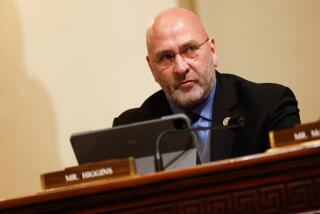Diggs Asks Voters for 2nd Chance
- Share via
HILLCREST HEIGHTS, Md. — An unrepentant Charles Diggs Jr. is seeking a political comeback a decade after leaving Congress in disgrace, hoping that voters will remember his accomplishments more than the kickback scandal that forced him from office.
“That happened 10 years ago,” said Diggs, who is running for the Maryland Legislature. “And we fought it right to the end. If that case had been brought up today it would have been thrown out. Should have been thrown out then.”
Diggs, a Democrat who represented Michigan in the U.S. House for 25 years, said he does not view his candidacy for the Maryland House of Delegates as a launching pad for a return to Congress.
In fact, he said he wants to serve just one four-year term as a state lawmaker so he can help redraw Maryland’s political district lines, a process that blacks hope will boost their numbers in the Legislature and Congress.
“Blacks are very under-represented in several areas in this state,” Diggs said. “I have been through redistricting in Michigan. There’s negotiation, give and take, and I would be lending my experience to a situation that needs a remedy.”
He was involved in Michigan reapportionment negotiations that followed the 1960 census. After the state’s House boundaries were realigned, Michigan became the first state since Reconstruction with two black congressmen.
Diggs, one of five Democrats seeking three delegate slots in Maryland’s 26th House District, now runs a funeral business in suburban Prince Georges County outside Washington. He said people in his district have not discouraged him from running because of his past legal troubles.
Diggs, 67, claimed he was a victim of selective prosecution and double standards when he was indicted in 1978 on charges of mail fraud and skimming $66,000 from his staffers’ padded paychecks.
It was a position he maintained throughout a trial that produced guilty verdicts on all 29 counts, a lengthy congressional inquiry that ended with a formal censure, a six-month prison term and ensuing years of financial and legal trouble.
He offers the same defense even now, saying he was dealt with more harshly than other lawmakers accused of ethical transgressions. He believes his outspoken criticism of U.S. policy toward Africa was one reason.
“I was the biggest anti-South African around,” Diggs said. “They were very upset with me, didn’t allow me in the country for a long time. There was a lot of speculation that people were trying to derail me because of the influence I was exerting regarding Africa.”
It was nearly 40 years ago that Diggs launched his political career by winning a term in the Michigan Legislature.
He went on to become one of the nation’s most powerful black officials, founding the Congressional Black Caucus and chairing the House subcommittee on Africa and the committee that oversees the District of Columbia.
John Kotelly, the former assistant U.S. attorney who prosecuted Diggs, said it is up to the voters to decide whether to give him another chance.
“It’s ancient history,” said Kotelly, now a private attorney in Washington. “I don’t believe that anybody has to wear sackcloth forever after being convicted.”
Diggs was born into a politically active Detroit family in 1922. His father, Charles Diggs Sr., was a wealthy funeral home director and real estate investor and the first man in town to sell blacks coffins made of material other than wood.
The younger Diggs entered the family business and was elected a Michigan legislator in 1950. Four years later, he won the first of 13 terms in Congress, where his influence grew as he gained seniority.
A federal grand jury indicted Diggs on kickback charges in 1978. He was convicted on all counts but won reelection a month later and continued serving in Congress while his sentence was appealed.
In June, 1979, a Republican-led effort to expel Diggs from the House failed by eight votes. A month later, he stood silently at the front of the House chamber as his formal censure was read.
Diggs resigned from Congress in June, 1980, after the Supreme Court declined to hear his appeal.
Over the next several years he fought to regain his mortician’s licenses in several states, clashed with the Treasury Department over payment of his court-ordered fine, and was charged with drunk driving three times.
He also graduated from Howard University, more than 40 years after leaving college to serve in World War II.
Diggs, who lives almost within view of Capitol Hill, said he doesn’t miss his days in Congress.
“When I drive by or see it on TV, it’s almost like an old dream,” he said. “It’s part of my experience, but I don’t sit around crying about it.”
More to Read
Sign up for Essential California
The most important California stories and recommendations in your inbox every morning.
You may occasionally receive promotional content from the Los Angeles Times.










